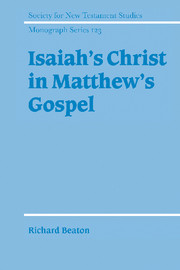Book contents
- Frontmatter
- Contents
- Preface
- List of abbreviations
- 1 Introduction
- 2 History of research
- 3 Texts and early Jewish exegesis
- 4 Isaianic formula quotations in Matthew
- 5 Isaiah 42.1–4 within the context of Matthew 11–13
- 6 The christological contribution of Isaiah 42.1–4
- 7 Conclusion
- Bibliography
- Index of passages
- Index of modern authors
- Index of subjects
6 - The christological contribution of Isaiah 42.1–4
Published online by Cambridge University Press: 22 September 2009
- Frontmatter
- Contents
- Preface
- List of abbreviations
- 1 Introduction
- 2 History of research
- 3 Texts and early Jewish exegesis
- 4 Isaianic formula quotations in Matthew
- 5 Isaiah 42.1–4 within the context of Matthew 11–13
- 6 The christological contribution of Isaiah 42.1–4
- 7 Conclusion
- Bibliography
- Index of passages
- Index of modern authors
- Index of subjects
Summary
If the role of Isa. 42.1–4 in Matthew is initially unclear and difficult to trace, its perceived contribution to Matthean christology is even more so. Kingsbury, for example, diminishes its import by asserting that ‘[Matthew] develops no “Servant christology” as such’, arguing instead that he ‘subsume[s] the title of Servant under the broader category of Son of God’. Gerhardsson and Hill elevate the servant texts, contesting that they provide substance for the otherwise vacuous Son of God title. The line of inquiry by Gerhardsson and Hill is widely supported and appears promising; however, the suggestion that Isa. 42.1–4 ‘fills out’ the Son of God title cannot account for the breadth of the citation's content within Matthew's ‘multi-faceted’ and diverse christology. No doubt one contributing factor to this state of affairs is the current transitional state of christological inquiry into the Synoptics. Thorough investigation of titles remains the predominant, if difficult, entry point, and NT scholars are indebted to the comprehensive studies by Hahn, Cullmann and Kingsbury. The frequently cited article by Keck seems to have given voice to scholarly disquiet concerning a purely titles-based approach to christological inquiry, and since Keck several studies have moved beyond this limitation to explore the interrelationship between the titles and the narratives in which they are encased.
- Type
- Chapter
- Information
- Isaiah's Christ in Matthew's Gospel , pp. 174 - 191Publisher: Cambridge University PressPrint publication year: 2002



